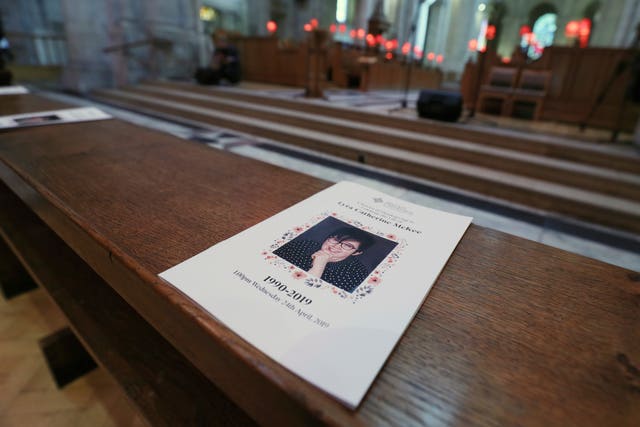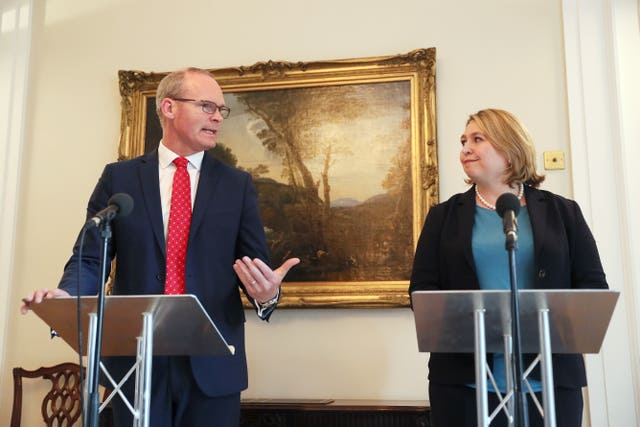
Hunger for politicians to achieve positive change in Northern Ireland was symbolised by mourners “pressuring” leaders to stand at the funeral of murdered journalist Lyra McKee, the priest has said.
The heads of Stormont’s main parties, including Sinn Fein’s Mary Lou McDonald and Arlene Foster of the DUP, gathered at St Anne’s Cathedral for the 29-year-old’s funeral on Wednesday.
The leaders were sat beside each other and a short distance from British Prime Minister Theresa May and Irish Taoiseach Leo Varadkar, along with a host of other political figures.
Fr Martin Magill asked the politicians why, two years after powersharing broke down in the Northern Ireland Assembly, it had taken the slaying of a young woman to bring them together.

The question, delivered with a tone of exasperation, received a standing ovation – although the politicians, sat at the front of the congregation, were the last to get to their feet.
Speaking to the BBC’s Andrew Marr show, the Catholic peacemaking priest suggested the striking images illustrated the wider public will for unity and change in Northern Ireland.
“The people, in a sense, really put the pressure on in the cathedral to stand,” he said.
“Obviously the politicians realised; ‘Oh goodness, everybody behind us is standing, we need to move,’ and they literally moved because people had moved.
“To some extent, it’s almost a metaphor – that I get the sense that people want our politicians to move, and they want them to move now.
“By that, I mean in terms of entering into those talks and in a way that will bring a positive result at the end of them.”
While welcoming the meeting of the British Irish Intergovernmental Conference and the announcement of renewed talks, Sinn Féin deputy leader @moneillsf said that renewed political talks must urgently address and resolve the issues of equality, rights and integrity in government pic.twitter.com/yZdFA0IMA6
— Sinn Féin (@sinnfeinireland) April 26, 2019
The British and Irish governments have since confirmed a new round of political talks aimed at re-establishing devolved powersharing.
It was announced that talks on the restoration of powersharing institutions will resume on May 7 and all the main parties will be invited.
Endless rounds of negotiations failed to break the deadlock, with Sinn Fein rejecting DUP leader Arlene Foster’s latest offer to break the political impasse.
Mrs Foster wants a twin-track approach where the devolved institutions are restored quickly to deal with issues such as running the health service, while a separate process addresses disagreements like that over same-sex marriage.
She told BBC Radio 4’s Today: “What we are doing at the moment is not having a government and that is hurting ordinary people, it’s hurting them in terms of hospitals and education and infrastructure and job creation.
“So why can’t we just set up the assembly and have the parallel talks process – if necessary, have it in a time-limited way so that we can get government back and working in Northern Ireland.”
.@conormurphysf tells @BBCRadio4’s #Today programme that any talks process needs to address the outstanding issues of rights and that the British and Irish governments need to live up to their responsibilities to the Good Friday Agreement pic.twitter.com/fHlqhPpPYI
— Sinn Féin (@sinnfeinireland) April 27, 2019
Sinn Fein’s Conor Murphy told Today that progress on same-sex marriage would be a “fitting tribute” to Ms McKee.
But Mrs Foster said people should also acknowledge the”strength of feeling in relation to traditional marriage and that has been our policy for some time and continues to be our policy”.
She added: “The place to have this discussion is on the floor of the assembly, the place to have a vote is in the assembly so people can register their approval or disagreement.
“It’s not in the talks process, it’s on the floor of the assembly and if people want to put forward their views that‘s the place to to do it.”
Sinn Fein deputy leader Michelle O’Neill has rejected that and said issues such as marriage equality and protection for the Irish language need to be delivered to pave the way for restoration of the devolved institutions.

On Friday, Northern Ireland Secretary Karen Bradley called on political leaders to take inspiration from Ms McKee’s life.
The journalist, who dedicated much of her time to investigating issues linked to the Troubles and giving a voice to marginalised groups, was remembered by her family as a “gentle, innocent soul” whose “desire to bring people together made her totally apolitical”.
Ms McKee was shot by dissident republicans during clashes with police on the Creggan estate in Londonderry on April 18.


Comments: Our rules
We want our comments to be a lively and valuable part of our community - a place where readers can debate and engage with the most important local issues. The ability to comment on our stories is a privilege, not a right, however, and that privilege may be withdrawn if it is abused or misused.
Please report any comments that break our rules.
Read the rules here